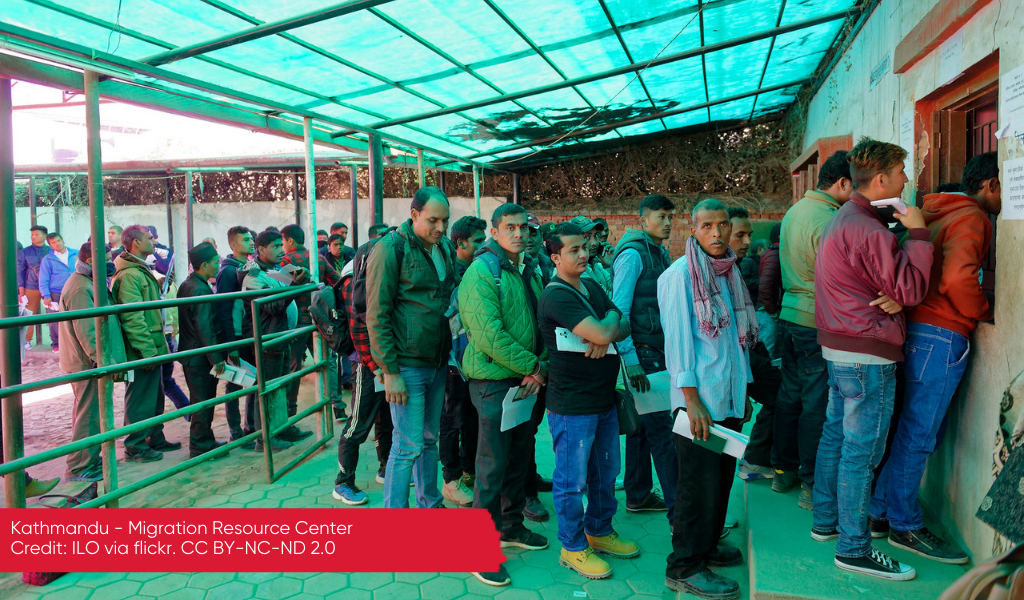Safe labour migration is key to international development. Labour migrants provide their families with more choices, such as finishing off an education, improving their houses, and avoiding indebtedness. In 2020, remittances sent home by Nepali international labour migrants were equivalent to 24.1% of the national Gross Domestic Product. We explore the role of labour intermediaries and private recruitment agencies (PRAs) in labour migration and human trafficking from Nepal.

Many countries were already restricting labour migration before Covid-19, and migrants have been among the worst hit by the pandemic. As decent work in rural areas in Nepal remains limited, people are willing to take risks, such as borrowing money at high interest, to find paid work abroad. This means that the services of labour intermediaries, formal and informal, are in high demand.
There is a wealth of existing literature on human trafficking focusing on the perspectives of victims, such as their rescue and rehabilitation. Very little is known about the perpetrators or alleged perpetrators involved. The concerns of formal labour intermediaries, such as PRAs, and migration-related service providers, such as pre-departure orientation training (PDOT) centres, who play a vital role in (safe) migration are largely unknown. Whether researchers consider labour intermediaries among the targets of social movements to stop trafficking , or as partners for responsible business, an understanding of their aspirations and working context is essential. Our mixed-methods study explores the concerns and constraints of major formal labour intermediaries − PRAs and PDOT centres− for their existing business practices.
In Nepal more than 70 per cent of the economically active population is involved in the informal economy and informal businesses make up around 50 percent of enterprises. The majority of Nepalese international labour migrants are men from rural areas. Due to its structure, any formalising, modernising or restructuring of the whole Nepalese international labour market is unlikely to happen any time soon.
Formalising and regulating “the sector” is also only part of the answer. The organisations that facilitate international labour migration are all in urban areas, mostly in Kathmandu. Is it realistic for every other village in Nepal to have a formal labour intermediary or to have pre-departure training centres? For example, who would pay for these? How many migrants would they need to see to be financially sustainable? Private agents, which can be informal companies or individuals, fulfil an important role in linking the rural supply with the urban intermediaries who mediate the global demand for Nepalese international labour.
Bureaucracy and erratic policies have contributed to increasing the overall migration costs for, and affected the safe migration of, Nepali workers. For example, PRAs have a mandatory requirement to send at least 100 workers for two consecutive years to have their license renewed, and the amount of deposit PRAs are required to make for business operation has recently increased. Factors such as these can encourage PRAs to procure labour demand from employers abroad without proper due diligence.
PRAs also have a statutory requirement publish advertisements in national daily newspapers in print format. Yet most potential migrant workers in remote villages do not have access to these papers, nor could they read and fully comprehend them if they did. At the moment, only a few big PRAs use social media. Minimal information on human trafficking is provided to migrant workers prior to departure, usually through online materials, print job advertisements, and face-to-face interactions with the potential migrants. Given the rising interconnectivity in Nepal, there could be a case for PRAs to be obliged to use social media to disseminate this information.
However, though providing workers with more information prior to departure about the risks of human trafficking is a popular measure, it’s not necessarily effective. One recent study on pre-departure training for prospective female migrants in the neighbouring India raised questions about the utility of pre-departure orientations. Providing people with information is a condition for but not a guarantee of behaviour change. People need to believe the information and be able to act on it for behaviour change to be possible. People in rural Nepal can see the benefits of migration for rural families in houses build with the money of a relative, or new roof on a mud residence, so doubt the credibility of risk training.
Although the expenses for migration can be one reason for indebtedness , remittances are a way out of poverty. One in nine people globally are supported by funds sent home by migrant workers. Risky migration may be a risk worth taking especially when the alternative is passive waiting for decent work in rural areas. PDOT classes have simply become a customary requirement in the process of getting labour permits. There is little incentive for the PDOT centres to improve their quality of service as they receive their clients mainly through their PRA network, rather than through competition based on quality.
Our research shows it is clear that there is an information gap between potential migrant workers and PRAs. This gap is mainly filled by informal labour intermediaries – commonly referred to as agents or brokers, a practice considered illegal. As a result, these informal labour intermediaries are not held accountable for their labour services and have no incentive from the state to provide quality service. This situation appears to suit the needs of many, except workers from rural areas who are cheated out of quality information about labour migration and end up being trafficked abroad into illegal work conditions. Our work continues to explore the role of labour intermediaries in labour practices in Nepal.
